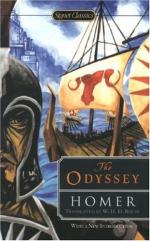“My friends,” said he, “this voyage of Telemachus’s is a very serious matter; we had made sure that it would come to nothing. Now, however, let us draw a ship into the water, and get a crew together to send after the others and tell them to come back as fast as they can.”
He had hardly done speaking when Amphinomus turned in his place and saw the ship inside the harbour, with the crew lowering her sails, and putting by their oars; so he laughed, and said to the others, “We need not send them any message, for they are here. Some god must have told them, or else they saw the ship go by, and could not overtake her.”
On this they rose and went to the water side. The crew then drew the ship on shore; their servants took their armour from them, and they went up in a body to the place of assembly, but they would not let any one old or young sit along with them, and Antinous, son of Eupeithes, spoke first.
“Good heavens,” said he, “see how the gods have saved this man from destruction. We kept a succession of scouts upon the headlands all day long, and when the sun was down we never went on shore to sleep, but waited in the ship all night till morning in the hope of capturing and killing him; but some god has conveyed him home in spite of us. Let us consider how we can make an end of him. He must not escape us; our affair is never likely to come off while he is alive, for he is very shrewd, and public feeling is by no means all on our side. We must make haste before he can call the Achaeans in assembly; he will lose no time in doing so, for he will be furious with us, and will tell all the world how we plotted to kill him, but failed to take him. The people will not like this when they come to know of it; we must see that they do us no hurt, nor drive us from our own country into exile. Let us try and lay hold of him either on his farm away from the town, or on the road hither. Then we can divide up his property amongst us, and let his mother and the man who marries her have the house. If this does not please you, and you wish Telemachus to live on and hold his father’s property, then we must not gather here and eat up his goods in this way, but must make our offers to Penelope each from his own house, and she can marry the man who will give the most for her, and whose lot it is to win her.”
They all held their peace until Amphinomus rose to speak. He was the son of Nisus, who was son to king Aretias, and he was foremost among all the suitors from the wheat-growing and well grassed island of Dulichium; his conversation, moreover, was more agreeable to Penelope than that of any of the other suitors, for he was a man of good natural disposition. “My friends,” said he, speaking to them plainly and in all honestly, “I am not in favour of killing Telemachus. It is a heinous thing to kill one who is of noble blood. Let us first take counsel of the gods, and if the oracles of Jove advise it, I will both help to kill him myself, and will urge everyone else to do so; but if they dissuade us, I would have you hold your hands.”




